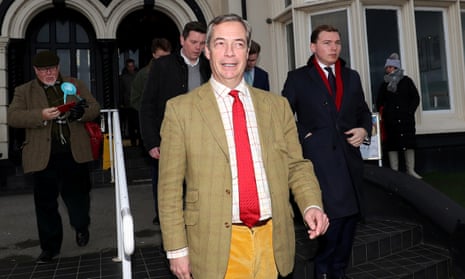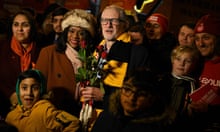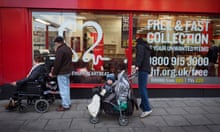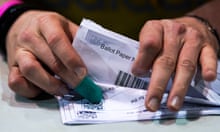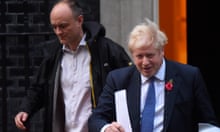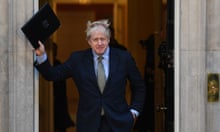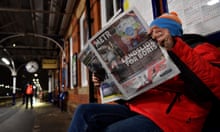Until 11 November, many had assumed that Nigel Farage’s Brexit party was revving up for a general election. But that morning, Farage told an audience of supporters and journalists in Hartlepool that his Brexit party would be standing down in 317 Conservative-held seats to avoid splitting the leave vote. The audience was stunned; there was muted applause after he finished.
This election will be remembered as a resounding, crushing victory for Boris Johnson’s Conservatives. Just as has happened countless times before, Farage will be written off and ridiculed for his party not winning a single seat. But that morning of 11 November was the single most important moment of the campaign. Farage won it for Johnson.
The decision to stand down against the Tories was not an easy one. According to Ed Jankowski, who was the Brexit party’s digital strategist until the middle of November before resigning, Farage was for a long time eager to stand in every seat and not stand down – as he was being pressured to do by his erstwhile Leave.EU ally Arron Banks. Farage instead kept pushing a leave alliance that the Tories were never likely to officially agree to. But as the Brexit party started to flag in the polls, Farage lost his nerve and gave in to those not wanting to challenge Conservative seats.
In Farage’s speech, and in the weeks following, he pledged to scoop up the leave vote in Labour heartlands and places people were unlikely to ever vote Tory. As for Jankowski, he told me that he pushed hard to get a detailed data set of Labour leavers. If he had stayed on, Jankowski says he would have pushed for the Brexit party to hone its digital content so that it made a strong emotional appeal to those voters.
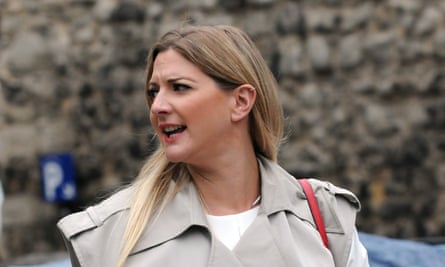
Instead of the sophisticated digital campaign Jankowski envisaged, the wheels seemed to come off the Brexit party campaign. Farage’s close ally Alexandra Phillips, who used to be his head of media at Ukip, publicly criticised the decision to stand down, saying she felt “disenfranchised” for not being able to vote Brexit party in her own Conservative-held constituency. Farage and the party chairman, Richard Tice, are also rumoured to have fallen out over strategy, with Farage no longer showing up in the seat Tice stood in Hartlepool.
Farage spent the rest of the campaign travelling predominantly to Labour leave seats, albeit to greatly diminished crowds compared to the big rallies seen earlier in the year. But while the shine had gone from the Brexit party, and it ended up winning no seats, its campaign has had a major impact on the election.
One of the early results of the election night, a Labour hold in Sunderland Central by 2,964 votes, was striking for the swing. Labour was down 13.4%, Conservatives up slightly by 2%, while the Brexit party had a swing of 11.6% from a standing start. When the first 10 seats were in, in mostly northern and Midlands seats, there was nearly a 10% drop for Labour, while the Conservatives were only up 2.1% and the Brexit party was scooping up a 6% swing.
In some places the Conservatives gained seats from Labour on modest swings, while the Brexit party got swings of more than 10%. In Don Valley, Caroline Flint’s 2017 majority of 5,169 appears to have been swallowed up by the Brexit party – which won 6,247 votes as the Tories took the seat. A similar dynamic appears to have taken place in Tony Blair’s former seat of Sedgefield.
Farage, whatever you think of him, was right. Many Labour leavers, who couldn’t bring themselves to vote Tory, did vote for the Brexit party. This wasn’t the case everywhere. In the much-watched seat of Workington, the Brexit party won little more than 1,749 votes to the Conservatives’ 20,488.
It’s not clear what happens to the Brexit party now, with a Conservative majority set to secure an exit from the EU. Farage has already registered the name of the Reform party. As this general election campaign wore on, Farage increasingly focused on radical reform – more direct democracy, scrapping of the House of Lords, a reformed electoral system. When I spoke to the Brexit party’s Claire Fox in October, she saw Brexit as the gateway to a kind of bloodless revolution for British democratic institutions. Fox is part of a core of former Revolutionary Communist party figures who have flocked to the Brexit party and remained loyal to Farage, who ended up convening around Spiked, the rightwing media outlet.
With Brexit a done deal, Farage himself is rumoured to be heading for the US to cash in via the lucrative speaker circuit. Farage basically admitted to Andrew Neil on election night that he would be giving stump speeches for Trump on the campaign trail for the US presidential election 2020.
Wherever he ends up, and whatever happens to the Brexit party now, this election is the culmination of a long campaign to redraw the map of British politics, starting with Farage forcing David Cameron’s hand in calling an EU referendum in the first place. Without Farage’s decision to stand down against 317 Conservatives, the election would have been very different. Without going hard after Labour leavers, the Conservatives would not have a thumping majority. Although his party hasn’t won a seat, and even if his campaign itself faltered, the untold story of this election is how Farage once again shaped events. He remains the bête noire of British politics.
